What is it about?
Our memory for events is fallible: We often forget or distort certain details or even remember things that never actually happened. Here, we showed that participants often inaccurately remember how events ended if the events were interrupted unexpectedly. For instance, if a video clip of a cyclist preparing to ride a bike was interrupted before the cyclist left, people would often falsely remember that they saw the person riding their bike away at the end. Conversely, if the video clip continued to briefly show the cyclist arriving at their destination before the clip was finished, participants would often not recall this additional detail and remember that the clip ended with the person preparing to ride their bike. These experiments highlight how people are biased to recall events as having well-defined end-points, even when that conflicts with what was actually experienced.
Featured Image

Photo by Hal Gatewood on Unsplash
Why is it important?
Our findings, demonstrate how common memory distortions are and they can arise from our prior knowledge about how stories are typically structured.
Read the Original
This page is a summary of: False memories for ending of events., Journal of Experimental Psychology General, August 2023, American Psychological Association (APA),
DOI: 10.1037/xge0001462.
You can read the full text:
Contributors
The following have contributed to this page










